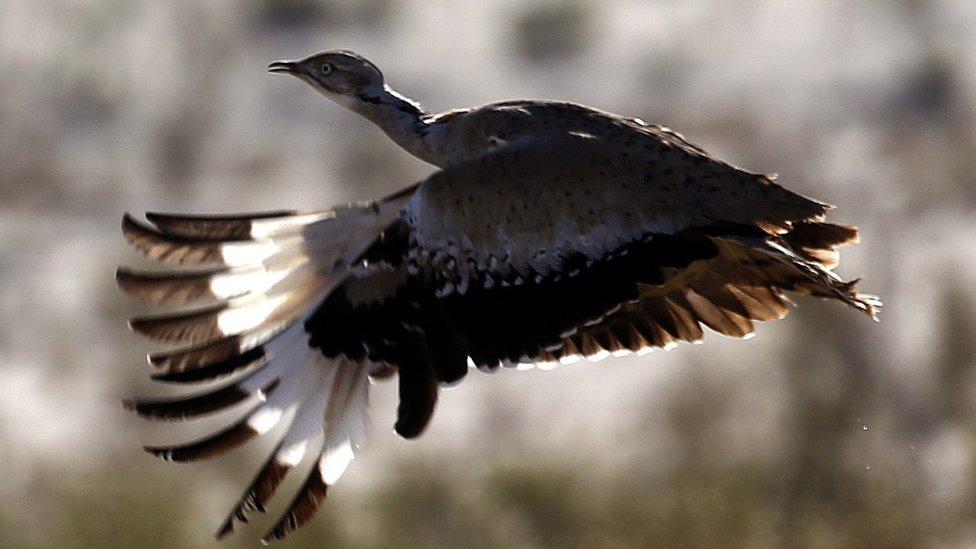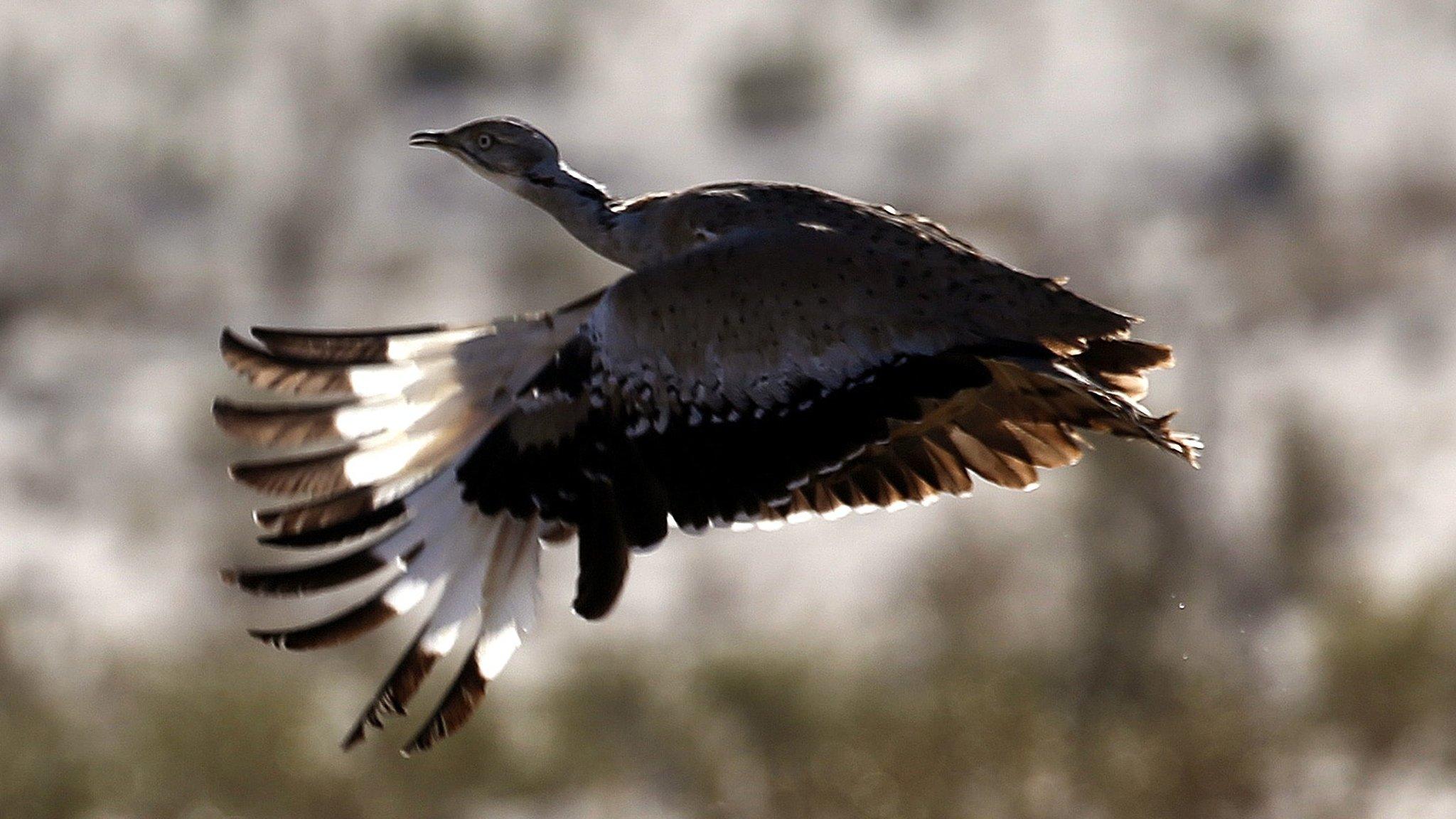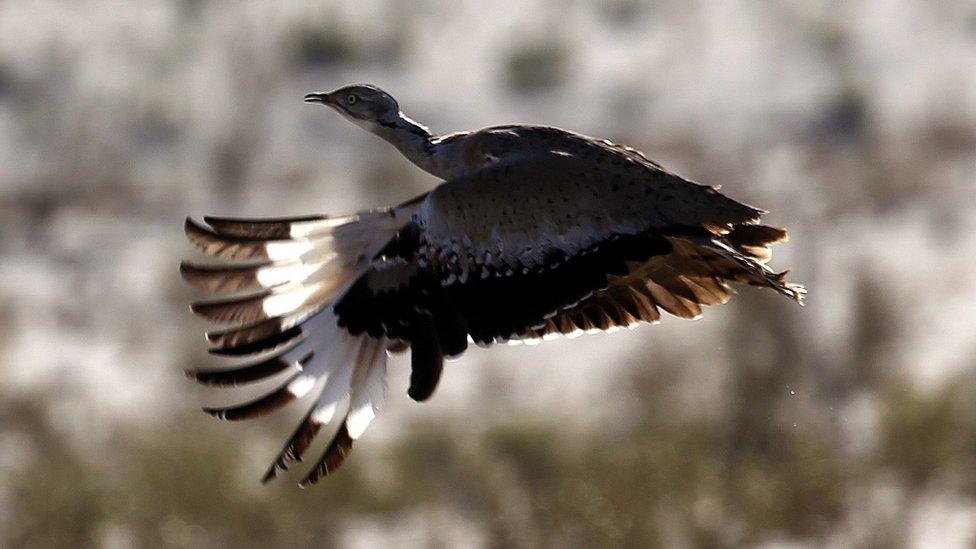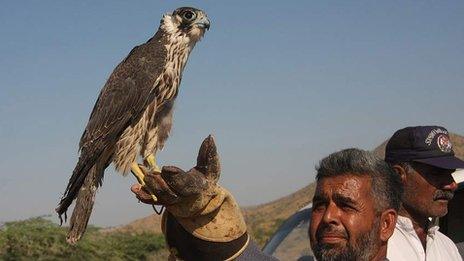How Pakistan's bustard hunting ban was shot down
- Published

In Arab countries the meat of the Houbara is thought by some to be an aphrodisiac
News that Pakistan's supreme court has lifted the ban on hunting Houbara bustards will delight many in Pakistan and the Middle East - even though the hunts are controversial. How did a shy but beautiful wild bird become a foreign policy issue? The BBC's Haroon Rashid explains the secretive world of bustard hunting.
The Houbara bustard, which resembles a turkey in shape, migrates in thousands from Central Asia to Pakistan every winter.
With them come rich influential Arabs to hunt them down. The meat is thought to be an aphrodisiac.
For more than four decades, Pakistan had been extending invitations to Arab dignitaries for the sustainable hunting of the Houbara bustard through falconry, in view of what the ministry calls "Pakistan's strong fraternal and diplomatic relations with Gulf countries".
Until last year, Arab royal family members would descend on the southern Pakistani desert regions of Balochistan and Punjab for the Houbara bustard hunt.
Convoys of vehicles
Government figures show no permits were issued after 19 Aug 2015 - when the supreme court issued a ban - but before that it had issued 29 licences to dignitaries of Gulf countries during 2014-2015. Each permit allows the dignitary to hunt in a designated area for up to 10 days, killing a total of 100 bustards.
The usual trend is that the Saudi VIPs travel to the southern Punjab district of Rahim Yar Khan while those from the Gulf states head to Balochistan's Awaran, Washuk, Chaghi and Jhal Magsi district. Pakistan leased Shamsi area in Washuk to the United Arab Emirates in 1992 for game hunting purposes.
Media coverage is not allowed on these private hunting expeditions, but it is believed that each hunt involves a convoy of dozens of vehicles.
"They come with their own cooks and other staff," a resident of Shamsi once told me.
These visits encouraged local economies and a number of Pakistanis were employed to help arrange expeditions.

Conservationists say hunting Houbara bustards in Pakistan will put the species in danger
A local manager told BBC Urdu - on condition of anonymity - that "many locals are able to hold their daughters' weddings each year after such visits".
"Many are able to construct their houses from the money earned because of these visits. It's a big economy in these under-developed areas."
Pakistanis are not in the habit of hunting Houbaras for themselves but they trap them in a big way to sell to smugglers who take them to the Gulf states.
A conservationist told the BBC the bird likes to walk more than fly, hence it is easy to catch. "These trapped birds are then smuggled out of Pakistan for a big price."
Last year, Pakistan's top court barred the government from issuing the permits to foreign dignitaries.
The uproar which led to the ban was caused by reports that a Saudi prince had killed around 2,100 birds on his last three-week hunting trip - 2,000 more than allowed under his permit.
Conservationists were angered, saying the guests were putting the species in danger.
'Houbaras welcome, Sheikhs not'
However, the government has argued that the bird is not an endangered species - and that the ban has "direct bearing upon foreign relations of the federation with the Gulf states".
Local governments have argued that allowing foreign dignitaries to hunt the bird brings benefits not only to the people but also the province.
"The dignitaries who come to hunt the bird have not only established certain welfare projects but are also paying 10m Pakistani rupees [$95,000; £66,500] for hunting 50 birds in season," Senator Maulana Attaur Rehman, from Balochistan, said.
He added that his province had been earning approximately Rs2bn every hunting season.
Now that the supreme court has overturned the ban, government officials will be looking forward to the chance to improve relations with Gulf states - and bring in revenue to the local states.
But not everyone will share the sentiment.
A few months ago, at a protest in Karachi against hunting, a placard said: "Houbaras welcome, Sheikhs not."
- Published22 January 2016

- Published9 September 2015

- Published23 November 2011
